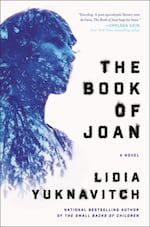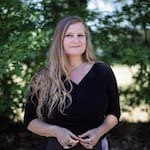
Lidia Yuknavitch's "The Book of Joan" explores astrophysics, environmentalism and love by placing the historical figure of Joan of Arc in a dystopian future.
Courtesy Harper Collins Publishers
To say Lidia Yuknavitch's newest novel "The Book of Joan" is a re-imagining of the Joan of Arc story in a dystopian science-fiction context would be accurate, but it's much more complicated than that.
Yuknavitch’s novel takes place in CIEL — a floating, technological world orbiting the solar system that is reeling from the brutal wars that destroyed Earth. Fought between Jean de Men, a celebrity evangelist turned dictator and our hero, Joan, the wars have mutated the surviving humans into genderless creatures whose main form of self expression is scarring their own skin.
Yuknavitch is a national bestseller, an Oregon Book Award winner and a writing instructor in Portland. Here are a few highlights from her conversation with Allison Frost on "Think Out Loud." Yuknavitch will read from "The Book of Joan" at Broadway Books on June 22.
Q&A with Lidia Yuknavitch

Lidia Yuknavitch's novel "The Book of Joan" re-imagines the character of Joan of Arc in a post apocalyptic world.
Christina Belasco / OPB
Allison Frost: How near and dear in your consciousness was the Joan of Arc story before you got this idea for the novel?
Lidia Yuknavitch: My sister and I were raised Catholic. She was eight years older than me and she took Joan as her communion name. So it came into my life as a little kid who only understood the story partially. And the two pieces I got: There was a burning girl and there was a girl warrior somewhere that people were hiding from us.
Frost: What is the importance of storytelling in this world? Because it’s not what one might think of when you think of a future world with a lot of technology.
Yuknavitch: It's huge. It's probably the core of the story. A question I'm very itchy about is: Who gets to own the story of reality? Who gets to tell it? And whose story wins?
Frost: Why graft the stories, burn the stories onto the human body?
Yuknavitch: The Christ body is a symbolic body that led to an entire belief system. For me, there was no girl body that had that power ... except when I started to excavate the Joan of Arc story. Rejoining the story of who we are to a body that was female was really important to me because the Christ story takes the story away from women ... except as vessels for producing. And so it was a matter of re-attaching the word to the body ... literally.
Frost: I’d like to ask about Jean de Men who’s obviously very central to this story. Did you have a historical inspiration for Jean de Men in mind?
Yuknavitch: Yes. There was a figure named Jean de Meun who had a faceoff with another medieval woman writer Christine de Pizan. And what I borrowed from history and dislocated was this debate between this powerful man and powerful woman ... in literary terms. As I was writing this three years ago, I was very upset about things like celebrity culture, capitalism and climate change. And thus, Jean de Men was born from both history and our present.
Frost: Were you still writing it when the run-up to the 2016 election was getting started?
Yuknavitch: No. A lot of people were asking me, "Were you thinking of Trump?" I wasn't thinking of Trump, but he was in the back of my mind as these out-of-whack celebrity rich people that have started to not care about the rest of us.
Frost: Can you describe how this Joan "got the call"? We sometimes think of the call in a religious context. Who or what was the call from?
Yuknavitch: I dislocated her from the theology we're most used to — another way of saying that is I took God out. Instead of that voice of a deity, I gave her the ability to hear the cosmos. And what she hears is like a loud orchestra mixed with what the rings of Saturn sound like. So she does hear something larger than life, I've just taken the monotheism out of it.
Frost: You said she doesn’t believe in God and you’ve taken God out of it. Does that go across the board for this world?
Yuknavitch: Yes and no. When I talk to people who are devout, I find a lot of crossroads with what they're saying as an atheist. When I look up into the night sky, I find wonder, a kind of faith, and certainly a place where storytelling is one of the most important acts we can do as humans.
Frost: Of the big relationships in the book, there's Joan and her female companion, Leone. How important was it that that was a lesbian relationship? And since Christine and her partner Trinculo are both without gender in this world, would you call this a queer relationship as well?
Yuknavitch: I was trying to open the idea and the body of queerness into a hundred different meanings. So the lesbian queer body for me was this radical question of what if we took the heterosexual reproducing body out as the center of the story and replaced it with a queer, lesbian, regenerating body ... which is what Joan has.
I don’t think that novels answer questions. I think the best novels hold questions suspended and make them alive in the reader. So I don’t have an answer for that, but that was the question I was trying to raise. It’s super important to me.